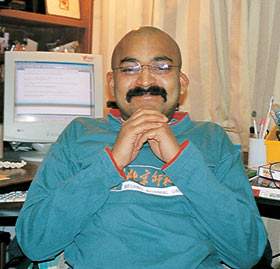| Trading Places |
| http://www.sina.com.cn 2004/11/24 18:28 thats China |
Heading East
 Heading East Move over, Europe: More foreign students are choosing Chinese universities for their overseas college experience By Pallavi Aiyar People often assumed I was Russian when I was first a student here in 1997," says Ross Jackson, a 27-year-old information systems auditor in Beijing. "There were so few white foreign students at the time and they were mostly from former Communist countries. We were quite a novelty. One time, a guy fell off his bicycle in surprise when he realized he was cycling past a foreigner." Jackson first came to Beijing to study Chinese at the Renmin University of China as part of a degree in East Asian Studies offered by Durham University in the United Kingdom. Back then, the idea of studying abroad in China was virtually nonexistent; students traditionally opted for programs in other Western countries. In the years since, however, tens of thousands of foreign students have begun flooding China's universities, transforming the country into a major center of global education. It's practically a Western invasion: At last count in 2002, about 85,000 foreign students from 175 countries were studying in China - an increase of 39 percent from the year before. Beijing alone was host to over 30,000 foreign students in 2003 and is expected to increase that number by 10,000 in 2004. "When I first came to study at Beijing Normal University four years ago, there were maybe 500 foreign students there," says 26-year-old Atish Ghosh. "Every single year, that number has gone up and I think there are way over 1,000 now. We are becoming quite commonplace." After earning a bachelor's degree in Chinese studies back in India, Ghosh is currently studying for a master's in film studies in Beijing. "When I initially decided to focus on Chinese, everyone thought I was weird," he says. "Now it's the 'in' thing. Everyone wants a slice of the opportunities China offers."  Atish Ghosh Jackson recounts a similar experience. "I remember going to a party in England just after having made up my mind to study Chinese, and all my friends ridiculed me," he says. "They thought China was a poor, backward place filled with nothing but bicycles. They couldn't understand why I would want to go there." After an internship at Parliament's House of Commons in London, Jackson realized that those in charge in Britain increasingly saw China as the next big power and decided that a degree focused on Chinese would be a great career investment. The venture paid off: Even after earning a master's degree, Jackson was unable to find a job in Britain. He turned to China, where he was snapped up by the accounting firm KPMG. The majority of his day-to-day work is conducted in Chinese. "When I joined the East Asian department at Durham, around 40 students in every year took Japanese and only 15 chose Chinese," Jackson says. "By the end of my fourth year, it was the other way around." |
|
|
|
|
|
| Annotation |
| 新闻查询帮助 | |
| 热 点 专 题 | ||||
| ||||
|
教育频道意见反馈留言板 电话:010-62630930-5178 欢迎批评指正
新浪简介 | About Sina | 广告服务 | 联系我们 | 招聘信息 | 网站律师 | SINA English | 会员注册 | 产品答疑
Copyright © 1996 - 2004 SINA Inc. All Rights Reserved
版权所有 新浪网![]() 北京市通信公司提供网络带宽
北京市通信公司提供网络带宽